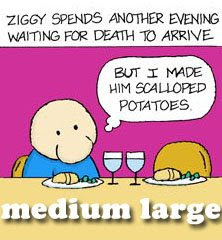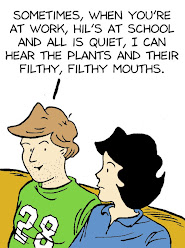Being an artist--whether that be writer, painter, musician, actor, comic or any multitude of undertakings--is a peculiar life in that you often have to live TWO lives: the one you want and the one that you need so you can do the one you want. (It's also a life that seems to involve copious tears and pointing at your old college English degree while screaming, "You did this to me! YOU DID THIS! I could have chosen a major with a financial future and less public and professional disdain but nooooooooo! GOD, I HATE YOU SO!!!")
As an artist you want to follow your muse. But as an artist you need to focus on a job (or sometimes a parallel career) to afford such a pursuit. A job that, alas, can be just enervating and exasperating enough to deprive you of the time, energy and desire you need to create and truly feel alive. So you wind up feeling a division within yourself, one that can often have a detrimental effect on both halves of your life.
But I'm here to say that you can do it all! You can have both your "serious, mature adult" life and your "passionate, expressive artist" life! And the best way I can prove such is to cite an actual, successful artist who has spent a lifetime expertly balancing these two conflicting sides. An artist who has been serious when need be so he can be playful and creative when he chooses to be. An artist who is able to write prose that in one case edifies and in the other purely entertains. An artist who is a veritable walking Janus mask.
An artist named Lionel Richie.
Lionel Richie Creative Impulse #1: Philosopher
Yes, innumerable renditions by a seemingly inexhaustible supply of wedding bands have made listening to the already excessively treacly Endless Love not unlike shoving a thorn bush through one’s ear canal. And yes, Easy (Like Sunday Morning) is second only to Norah Jones’s Don’t Know Why in causing automotive fatalities, inflicting almost instant narcolepsy upon the hapless driver who comes across the song on their car radio. But that in no way should diminish the astounding grasp Mr. Richie has had on the nation’s zeitgeist from decade to decade.
Take the year 1983. US Forces had just invaded Grenada. That “sonofabitch” Reagan had initiated the Strategic Defense Initiative. And Karma Chameleon was the number one song in the land. Clearly we were a nation on the brink of utter self-destruction. We needed answers. We required hope. And then, in the middle of one of our darkest hours, one individual had the courage, the conviction and, yes, the chutzpah, to utter the following startling words to a nation hungry for bold new ideas and a brave new direction:
I had a dream, I had an awesome dream
People in the park playing games in the dark
And what they played was a masquerade
From behind the walls of doubt
A voice was crying out!
Strong words. Strong, bewildering words from the poet laureate of pop himself, Mr. Lionel Richie. The very same man who had the stamina to party “all night long,” the temerity to “dance on the ceiling” and, in that one earnest, emotional video, the willingness to say “hello” to a blind art student. A blind art student who responded in turn by presenting Mr. Richie with a clay bust in his likeness–a bust that, quite frankly, could only have been sculpted by a person completely devoid of sight.
Now, to be perfectly honest, Mr. Richie’s Say You, Say Me is not without its faults. The song seemingly introduces an all-together different tune smack dab in the middle where one would normally expect to encounter a musical bridge or, at the very least, the same song. And for years pundits have argued over the precise meaning behind such cryptic turns of phrase as “Say you, say me/Say it together naturally” only to conclude that sometimes expressing a lucid thought comes second to simply finding the necessary number of syllables to utter during a tune.
But that’s neither here nor there. The important thing is that Mr. Richie–philosopher–was willing to share his dream with the public. He saw a problem in our society–a problem apparently having to do with either lax curfews or an impromptu costume party–and sought to address it the best way he knew how…during the closing credits sequence for the movie White Nights.
Lionel Richie Creative Impulse #2: Voluptuary
And then there’s the man who brought us Brick House. If Say You, Say Me was Mr. Richie’s Ulysses, Brick House was his, uh…Fear of Flying? Instead of the penetrating–if somewhat perplexing–social disquisition of the former song, Brick House laid bare the carnal impulses that truly make us human in a succinct dictum that defied criticism. After all, who in their right mind can cast aspersions against The Commodores’ hard-drivin’, rump-shakin’ machine of flat-out funk? Ronald LaPread’s rubbery bass groove. Clyde Orane’s tasty horn arrangements. Walter Orange’s come-hither vocals. Lionel Richie’s slithery stanzas. All these factors helped not only serve up a massive slice of 70’s soul but gave the world perhaps one of the best verses to ever worm its way into the collective unconscious. A verse that captures the conversational rhythms of William Carlos Williams, the atypical syntax of e.e. cummings and the immediate, lyrical intimacy of Rita Dove. A verse that reads in full:
She knows she got everything
A woman needs to get a man, yeah.
How can she lose with what she use
36-24-36, what a winning hand!
So there you have it, people. Mr. Lionel Richie. Bertrand Russell by day. Russell Simmons by night. How he keeps these two worlds from colliding we may never know. But if he can do it, then why can’t I? Why can’t we all?
I say good day.
Subscribe to:
Post Comments (Atom)







No comments:
Post a Comment